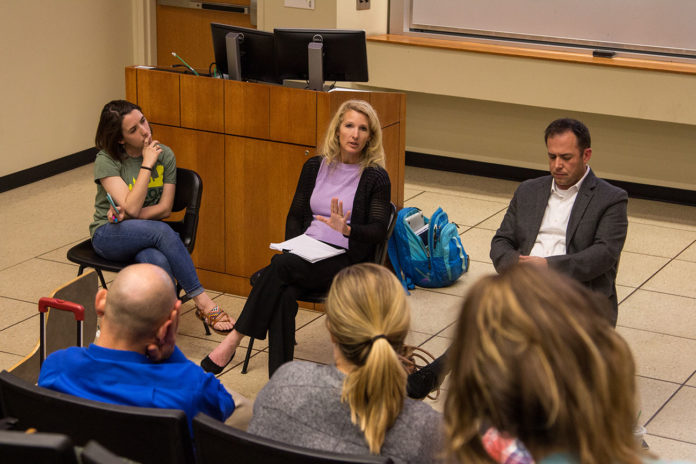
By Joy Moto | Staff Writer
A panel of faculty from the religion, public health and sociology departments hosted a discussion about how people relate to sex as the concluding part of a series about sexual assault and rape culture Thursday evening in the Baylor Sciences Building.
The series of conversations was part of an initiative for the It’s On Us Student Advisory Council during Sexual Assault Awareness Month. Throughout this month, members of Baylor faculty have engaged in public discussion about the role of sex education through the perspectives of spirituality, science, and society.
Faculty concluded the series by addressing the significance of sex education.
Dr. Beth Lanning, associate professor and director of the public health undergraduate program, advocates strongly for parents to initiate discussions about sex with their children.
“It’s not a one-time deal. It’s something you should start from birth,” Lanning said. “I don’t think of it as a class or a time, I think of a lifetime of communication between the parents and their child.”
Lanning said people miss significant opportunities to talk about sexual topics because they focus on more drastic issues than relationships.
“We focus on things like teen pregnancy, but we don’t talk about relationships,” Lanning said.
Lanning said there needs to be education about physical and emotional sexual health in relationships. She said people do not realize that relationships are costly because they do not recognize the subtle red flags that indicate problems in a relationship.
Lanning also said men should engage in discussion about the culture they grow up in.
“Guys should feel empowered to be able to say no to being sexually active. Guys receive a lot of pressure to prove their manhood and show their masculinity,” Lanning said.
She concluded by sharing that often people use sex as a tool, not a gift, and using it as a tool to keep someone or get back at someone can affect not only physical health, but also emotional health.
Dr. Christopher Pieper, lecturer of sociology, said it is important to expand the definition of education to the forming of a person and to look at responsible behaviors and boundaries. He said conversation can be limited to medical or highly technical terminology, and it prevents people from desiring to engage in conversation.
“This is a lifelong process of forming not only knowledge, but values about the topics we engage in,” Pieper said.
Pieper said it is especially important for men to engage in discussion about sex because they are raised in a culture where they are viewed as weak if they are not dominant.
“We need to have the goal of achieving a society where we raise young men with the value of equality, respect and affection,” Pieper said.
Pieper said the fundamental way in which people think about sex in general has to become less violent and assaultive.
“The idea of rape permeates society. Colonialism is built on the same logic — to take something that doesn’t belong to you. It’s no wonder why we look at women as another land of conquest,” Pieper said.
Pieper said it is the responsibility of other men to create an anti-rape, intimacy culture where women are not viewed as territory.
“Too much of this topic has been put on the women to protect themselves. No one has frank conversations with men about how they think about women,” Pieper said.
Pieper said speaking frankly in a Christian context about what healthy sexuality looks like will help as the university moves forward. He also emphasized the importance of speaking up and letting people know when something is not OK.
“Whenever you have the opportunity to stand up for something you believe in, you’re making cultural change,” Pieper said. “This is not somebody else’s responsibility. We perpetuate the culture by being quiet or fight back. If you’re silent, you’re endorsing it.”
For more information about the It’s On Us BU campaign, visit itsonus.org.





